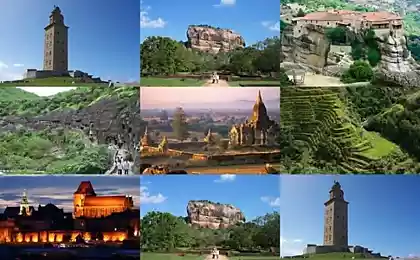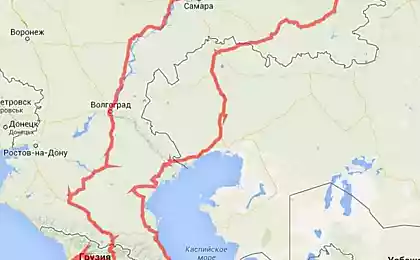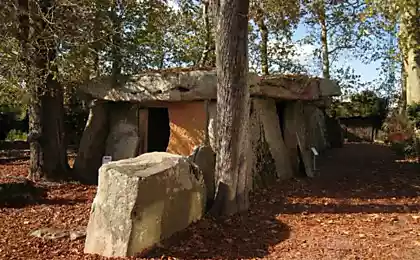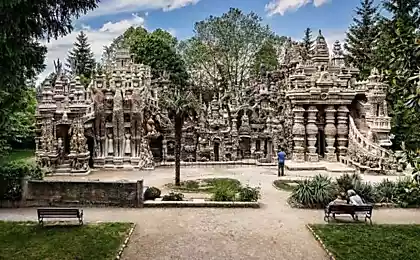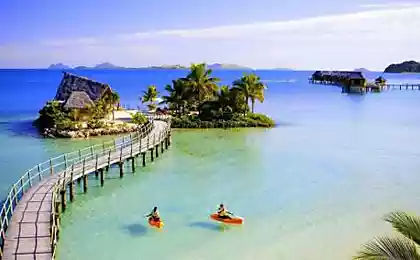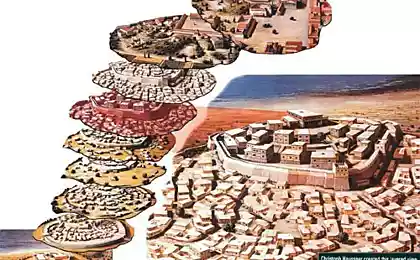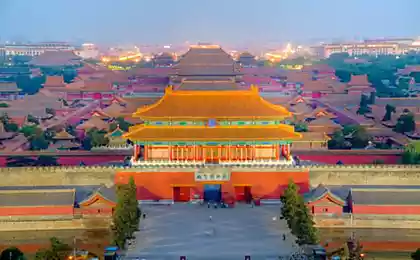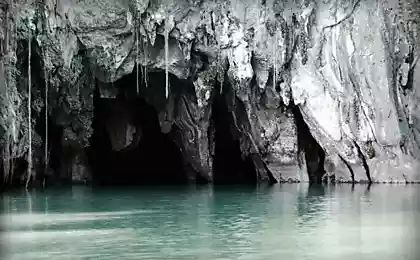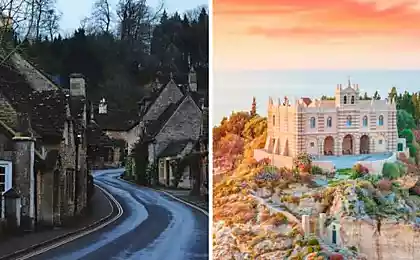1470
UNESCO World Heritage Sites
World Heritage, included in a special list of UNESCO are of great interest to the entire population of the planet. The unique natural and cultural sites make it possible to preserve the unique corners of nature and man-made monuments that demonstrate the richness of nature and possibilities of the human mind.
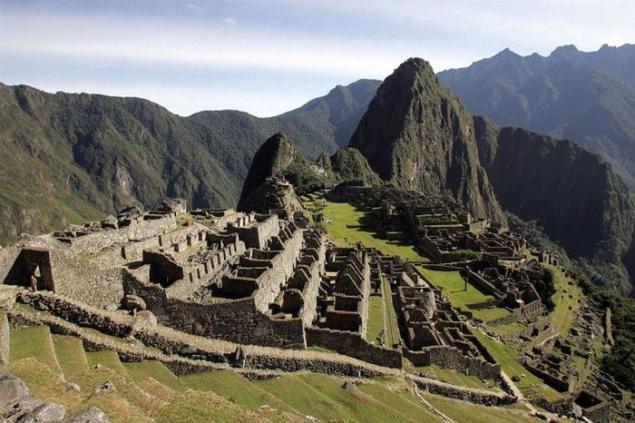
World Heritage, included in a special list of UNESCO are of great interest to the entire population of the planet. The unique natural and cultural sites make it possible to preserve the unique corners of nature and man-made monuments that demonstrate the richness of nature and possibilities of the human mind.
As of 6 July 2012 in the World Heritage List - 962 object (including 745 cultural, 188 - natural and 29 - mixed), located in 148 countries around the world. Among these there are some architectural monuments and ensembles, for example - the Acropolis, the cathedrals in Amiens and Chartres, the historic centers of cities - Warsaw and St. Petersburg, Moscow Kremlin, and Red Square; but there are also whole cities - Brasilia, Venice with the lagoon and others. There are also archaeological sites - such as Delphi; national parks - Marine Park Great Barrier Reef, Yellowstone (USA) and others. State in whose territory the World Heritage sites, are committed for their conservation.
In this you will see the Pictures of the 29 objects from different parts of our planet, which are listed UNESCO World Heritage Site.
1) Tourists visiting the Buddhist Sculpture Grottoes Longmen ("Drakensberg Gate") near the city of Luoyang in China's Henan province. At this point, there are more than 2300 caves; 110,000 Buddhist images, more than 80 Dagobah (Buddhist mausoleums), containing relics of the Buddha and 2800 inscriptions on the rocks near the river Yishui length of a kilometer. For the first time Buddhism was introduced in China in these places during the reign of the Eastern Han Dynasty. (China Photos / Getty Images)
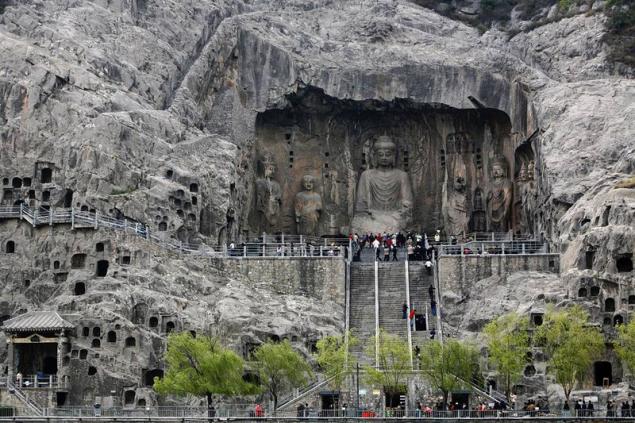
2) Bayon Temple in Cambodia, famous for its numerous giant stone faces. The region of Angkor temples there are more than 1,000, ranging from nondescript piles of brick and rubble scattered among rice fields to the magnificent Angkor Wat, which is considered the world's largest single religious monument. Many of the temples at Angkor have been restored. Every year they are visited by over a million tourists. (Voishmel / AFP - Getty Images)
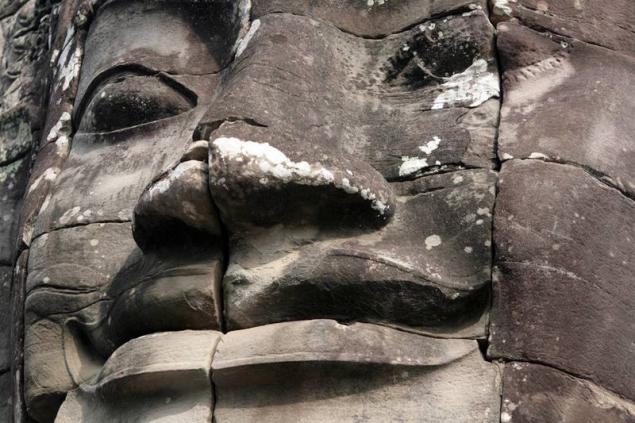
3) One part of the archaeological site of Al-Hijr - also known as Madain Salih. This complex, located in the northern regions of Saudi Arabia was added to UNESCO World Heritage List July 6th 2008. The complex includes 111 rock graves (I century BC. Oe. - I century BC), as well as a system of waterworks, dedicated to the ancient Nabataean city of Hegra, is a center of caravan trade. It also has about 50 inscriptions in the rocks belonging to donabateyskomu period. (Hassan Ammar / AFP - Getty Images)
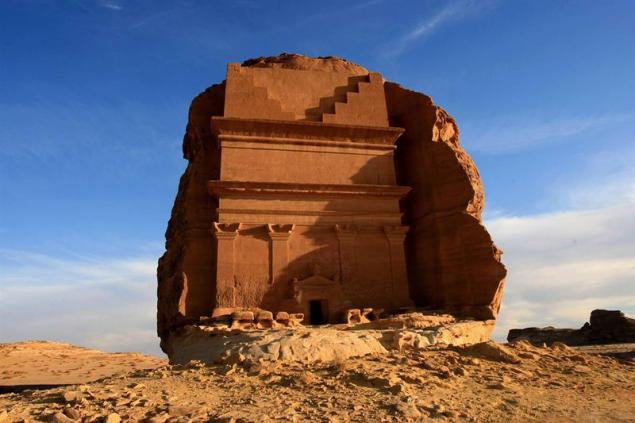
4) Waterfalls «Garganta del Diablo» («Devil's Throat" are located in the Iguaçu National Park in the Argentine province of Misiones. Depending on the water level in the river Iguazu, in the park there are from 160 to 260 waterfalls and more than 2,000 species of plants and 400 species of birds. Iguazu National Park was included in the World Heritage List in 1984. (Christian Rizzi / AFP - Getty Images)
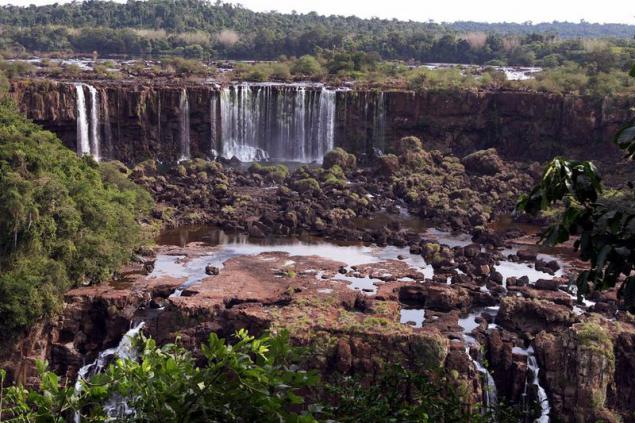
5) The mysterious Stonehenge megalithic stone structure, consisting of 150 huge stones, and is located on Salisbury Plain in the English county of Wiltshire. This ancient monument is believed to have been built in 3000 BC Stonehenge was included in the UNESCO World Heritage list in 1986. (Matt Cardy / Getty Images)
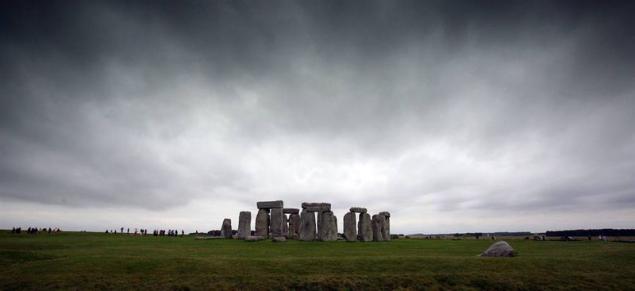
6) Tourists stroll from Bafang Pavilion in the Summer Palace, a famous classic imperial garden in Beijing. Summer Palace, built in 1750 was destroyed in 1860 and rebuilt in 1886. It was included in the World Heritage List in 1998. (China Photos / Getty Images)
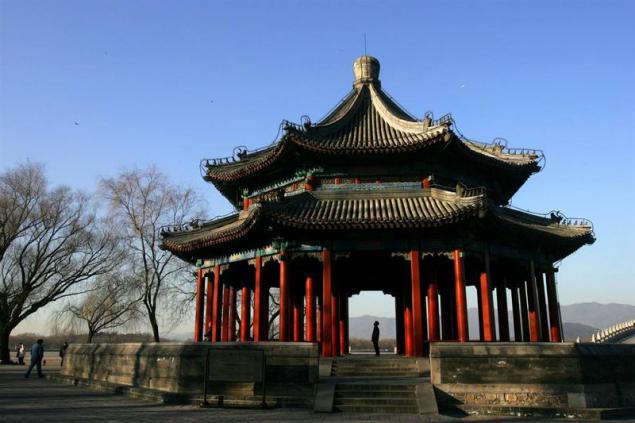
7) Statue of Liberty at sunset in New York. "Lady Liberty", which was presented to the United States, France, stands at the entrance to New York Harbor. It was included in the World Heritage List in 1984. (Seth Wenig / AP)
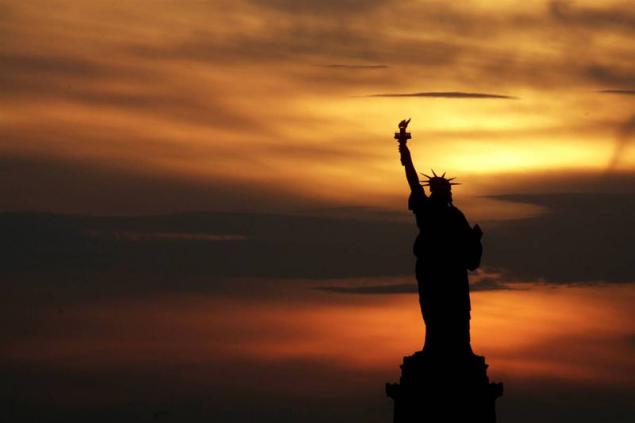
8) «Solitario George» (Lonesome George), the last living giant tortoise of this species, was born on the island of Pinta, lives in the Galapagos National Park in Ecuador. She is now about 60-90 years. The Galapagos Islands were originally included in the World Heritage List in 1978, but in 2007 were noted as endangered year. (Rodrigo Buendia / AFP - Getty Images)

9) People skating on the ice channel near the mills of Kinderdijk, a UNESCO World Heritage Site and is located near Rotterdam. In Kinderdijk in the Netherlands is the largest collection of historic mills, in addition, the region is one of the main attractions in South Holland. Making balls celebrations taking place here, it gives a flavor of the place. (Peter Dejong / AP)
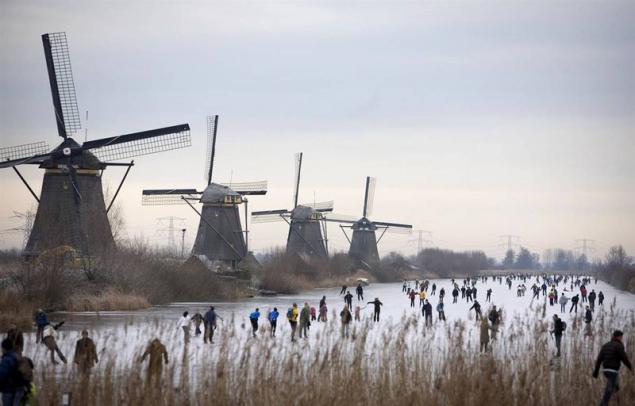
10) View of the Perito Moreno Glacier is located in the National Park Los Glaciares National Park, in south-eastern Argentine province of Santa Cruz. This place was listed as a UNESCO World Heritage Site in 1981. Glacier is one of the most interesting tourist attractions in the Argentine Patagonia and parts of the 3rd largest glacier in the world after Antarctica and Greenland. (Daniel Garcia / AFP - Getty Images)
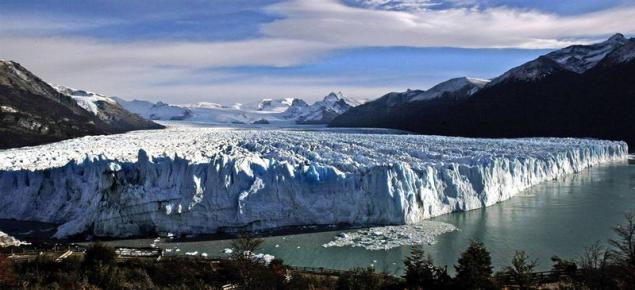
11) terraced gardens in the northern Israeli city of Haifa is surrounded by the golden-domed Shrine of the Báb, the founder of the Baha'i Faith. There is a global administrative and spiritual center of the Baha'i religion, the number of practicing that worldwide less than six million. This place was declared a World Heritage Site on July 8 2008. (David Silverman / Getty Images)
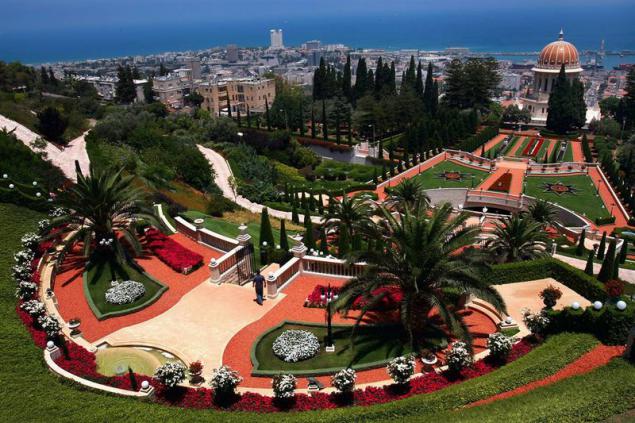
12) Aerial view of the square of St.. Peter's in Vatican City. According to the website of the World Heritage within this small state is a unique collection of artistic and architectural masterpieces. The Vatican has been included in the World Heritage List in 1984. (Giulio Napolitano / AFP - Getty Images)
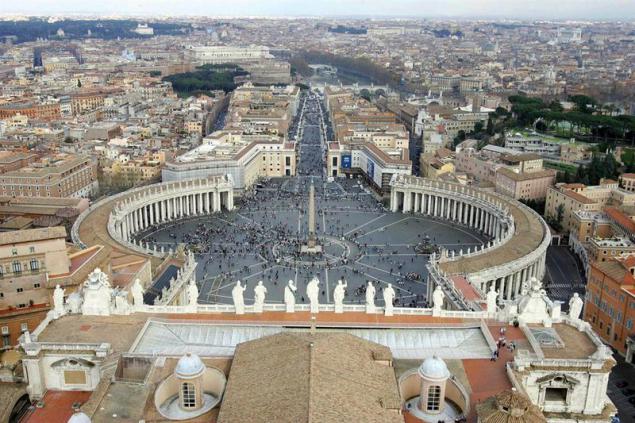
13) The colorful underwater scenes the Great Barrier Reef in Australia. In this thriving ecosystem is the world's largest collection of coral reefs, including 400 species of coral and 1,500 species of fish. The Great Barrier Reef has been included in the World Heritage List in 1981. (AFP - Getty Images)

14) Camels resting in the ancient city of Petra in front of the main monument of Jordan, Al-Khazneh, or treasury, presumably representing a tomb of Nabataean king, carved from sandstone. This city is located between the Red and the Dead Sea, located at the crossroads of Arabia, Egypt, Syria, and Phoenicia. Petra is a UNESCO World Heritage in 1985. (Thomas Coex / AFP - Getty Images)
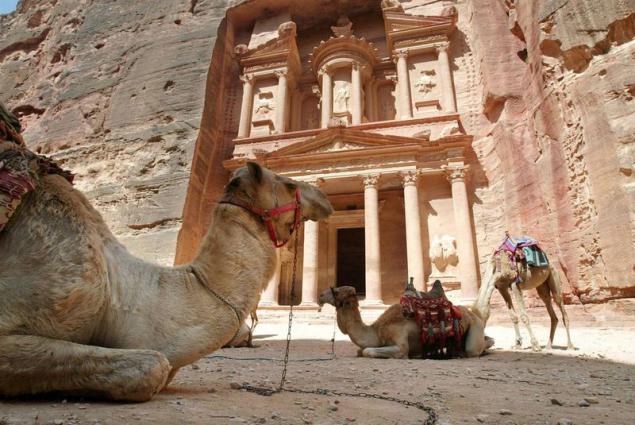
15) Sydney Opera House - one of the most famous and recognizable buildings in the world, is a symbol of Sydney and one of the main attractions of Australia. The Sydney Opera House is included in the program of the World Heritage in 2007. (Torsten Blackwood / AFP - Getty Images)
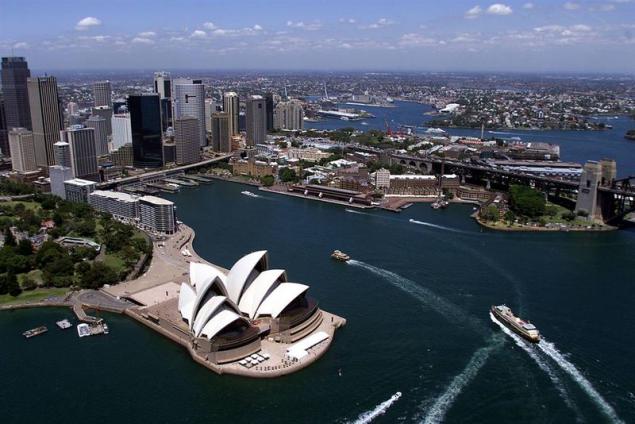
16) Rock paintings made by the San people of the tribe in the Drakensberg Mountains, located in the east of South Africa. San tribe people lived in the area Drakensberg thousands of years until it was destroyed during clashes with the Zulus and white settlers. They left behind an incredible rock paintings in the Drakensberg Mountains, which have been made in the program of the UNESCO World Heritage Site in 2000. (Alexander Joe / AFP - Getty Images)
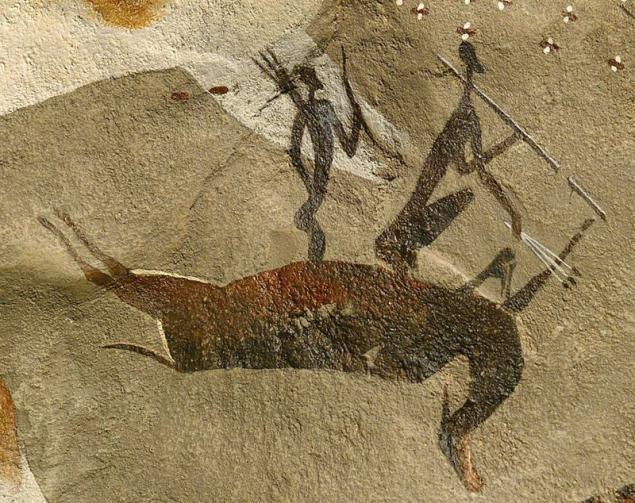
17) General view of the city of Shibam, in the east of Yemen's Hadramout province. Shibam is renowned for its incomparable with anything comparable architecture, which is included in the UNESCO World Heritage program. All the houses here are built of mud bricks, approximately 500 homes can be considered a high-rise, as they have 5-11 floors. Shibam is often called "the oldest skyscraper city in the world" or "Manhattan of the desert", is also the oldest example of urban planning based on the principle of vertical construction. (Khaled Fazaa / AFP - Getty Images)
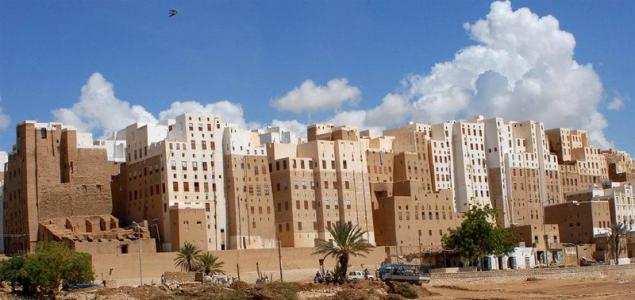
18) Gondolas at the Grand Canal in Venice. On the background is visible the church of San Giorgio Maggiore. Venice Island - the seaside resort, the center of international tourism of global importance, the venue of international film festivals, art and architectural exhibitions. Venice included in the program of the UNESCO World Heritage Site in 1987. (AP)
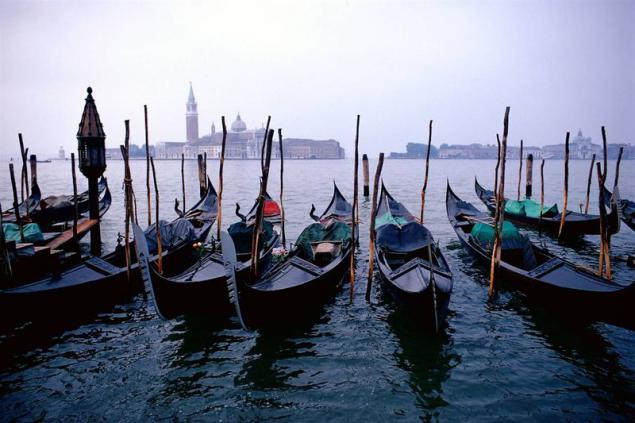
19) Some of the 390 abandoned huge statues of compressed volcanic ash (moai on Rapa Nui language) at the foot of the volcano Rano Raraku on Easter Island, 3,700 km from the coast of Chile. National Park Rapa Nui is included in the program of the UNESCO World Heritage since 1995. (Martin Bernetti / AFP - Getty Images)
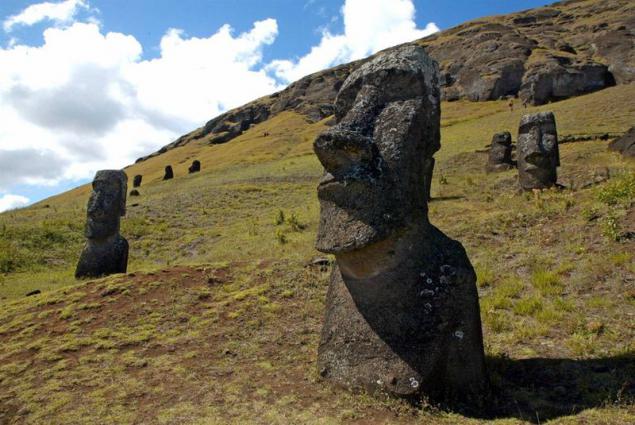
20) Visitors walk along the Great Wall of China in Simatai district, north-east of Beijing. It is the largest monument of architecture was built as one of the four major strategic strongholds for the purpose of defense against invading tribes from the north. Great Wall length of 8851, 8 km away is one of the largest ever completed construction projects. It was included in the World Heritage List in 1987. (Frederic J. Brown / AFP - Getty Images)
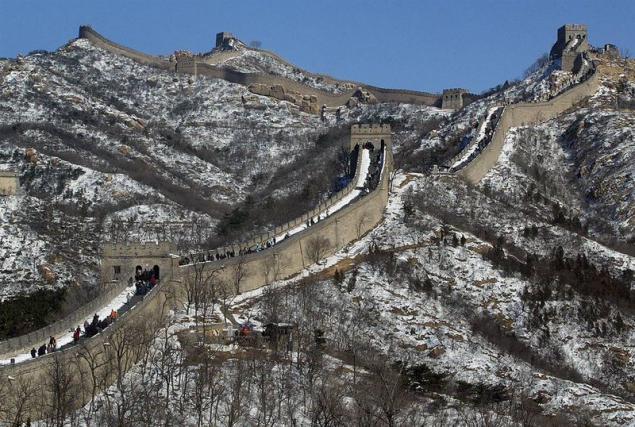
21) Temple in Hampi, near the southern Indian city of Hospet, north of Bangalore. Hampi is located in the midst of the ruins of Vijayanagara - former capital of the Vijayanagara Empire. Hampi and its monuments have been included on the List of World Heritage Sites in 1986. (Dibyangshu Sarkar / AFP - Getty Images)
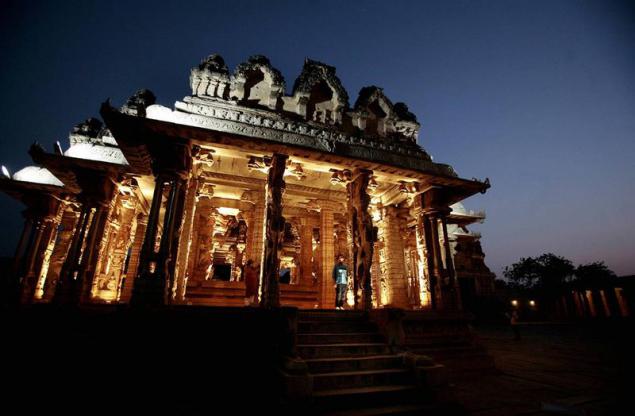
22) Tibetan pilgrim prayer mill rotates in the territory of the Potala Palace in Tibet's capital Lhasa. Potala Palace - a royal palace and Buddhist temple complex, which was the main residence of the Dalai Lama. Today the Potala Palace is a museum, is actively visited by tourists, while remaining a place of pilgrimage for Buddhists and continuing use in Buddhist rituals. In view of the huge cultural, religious, artistic and historical significance made to the 1994 UNESCO World Heritage Site. (Goh Chai Hin / AFP - Getty Images)
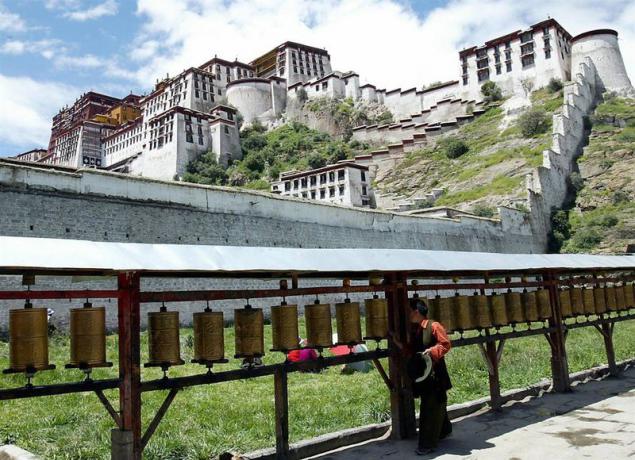
23) Inca citadel of Machu Picchu in the Peruvian city of Cusco. Machu Picchu, especially after obtaining the status of World Heritage Site by UNESCO in 1983, became a center of mass tourism. On the day of the city is visited by 2,000 tourists; in order to preserve the monument by UNESCO calls to reduce the number of tourists per day to 800. (Eitan Abramovich / AFP - Getty Images)
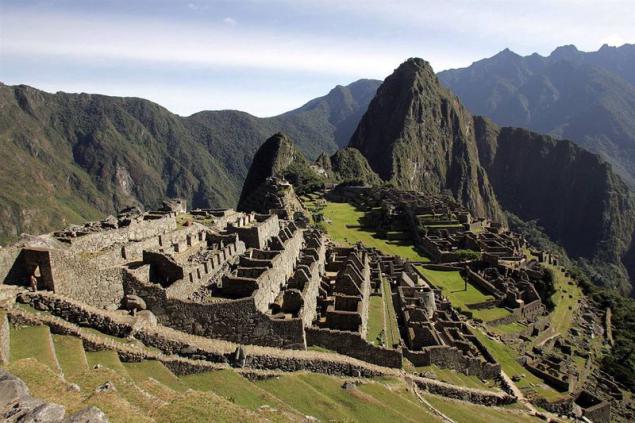
24) The Buddhist pagoda Kompong-Daito on Mount Koya, in the province of Wakayama, Japan. Mount Koya, located east of Osaka, was listed as a UNESCO World Heritage site in 2004. The first settled here 819 a Buddhist monk Kukai, founder of Shingon, a branch of Japanese Buddhism. (Everett Kennedy Brown / EPA)
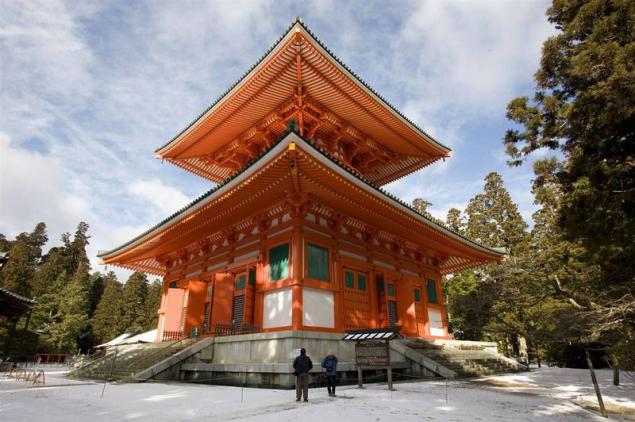
25) Tibetan women walking around Bodhnath Stupa in Kathmandu - one of the oldest and most revered Buddhist shrines. On the faces of his crowning tower depicts the "eyes of Buddha", inlaid with ivory. Kathmandu Valley a height of about 1300 meters - mountain valley and a historical region of Nepal. Here there are many Buddhist and Hindu temples from the stupa Bodnath to tiny street altars in the walls of houses. Locals say that the Kathmandu Valley in the lives of 10 million gods. Kathmandu Valley was added to the World Heritage List in 1979. (Paula Bronstein / Getty Images)
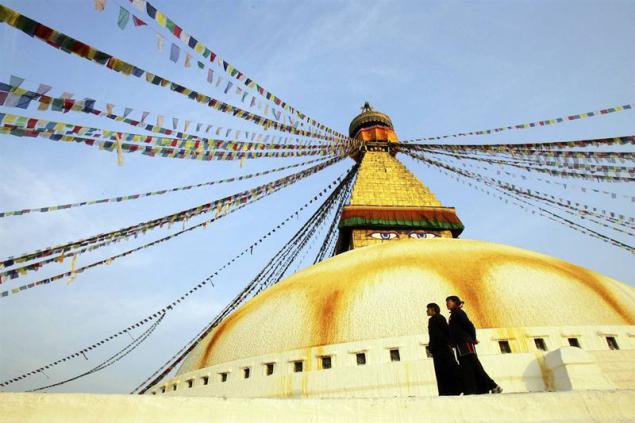
26) A bird flies over the Taj Mahal - the mausoleum-mosque, located in the Indian city of Agra. It was built by Mughal emperor Shah Jahan in memory of his wife Mumtaz Mahal, who died in childbirth. Taj Mahal was included in the UNESCO World Heritage List in 1983. Architectural marvel was also named one of the "New Seven Wonders of the World" in 2007. (Tauseef Mustafa / AFP - Getty Images)
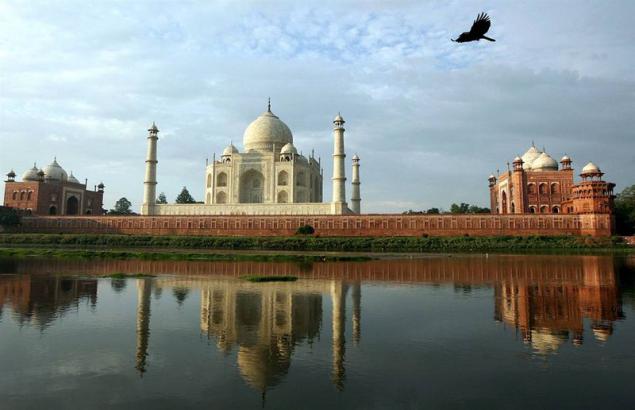
27) Located in the north-eastern Wales, the 18 kilometer long Pontcysyllte Aqueduct - a feat of civil engineering of the Industrial Revolution, which was completed in the early years of the 19th century. After more than 200 years after its opening, it is still used and is one of the busiest areas of the UK network channel, passing approximately 15,000 boats per year. In 2009, the aqueduct Pontkisilte was entered in the UNESCO World Heritage List as "a milestone in the history of civil engineering of the Industrial Revolution." This aqueduct - one of the most unusual sites plumbing and running water (Christopher Furlong / Getty Images)
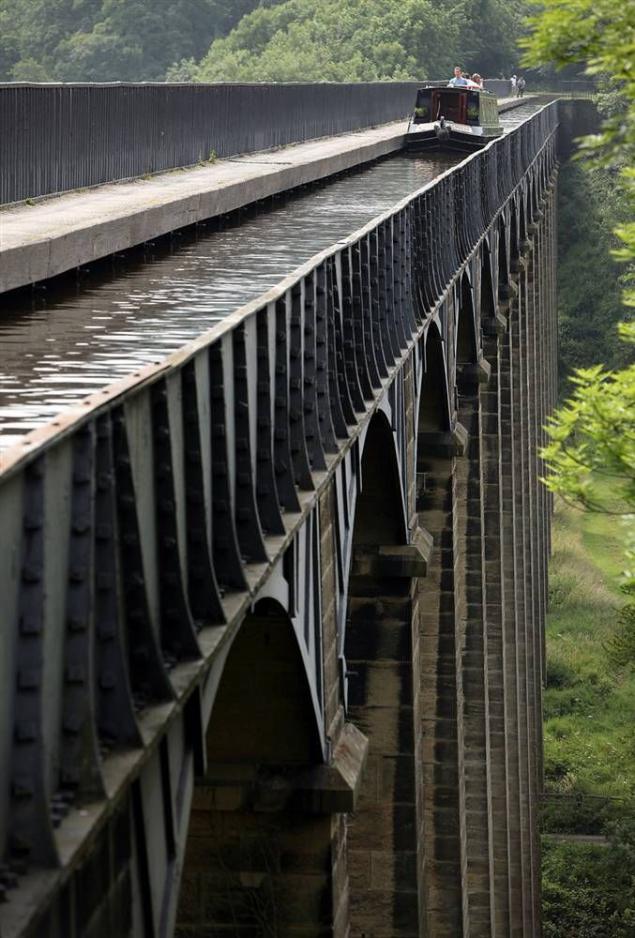
28) A herd of elk grazing in the meadows of Yellowstone National Park. Against the backdrop of a mountain visible Holmes, left, and Mount Dome. In Yellowstone National Park, which occupies nearly 900 thousand. Ha, is more than 10,000 geysers and hot springs. Park was included in the World Heritage Site in 1978. (Kevork Djansezian / AP)
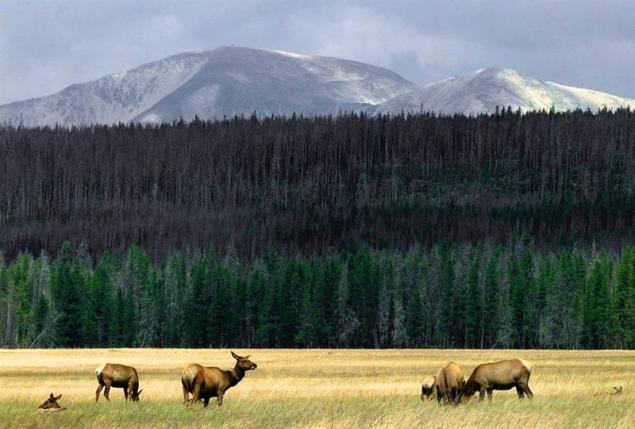
29) The Cubans go to the old car on the promenade "Malecon" in Havana. UNESCO has made Old Havana and its fortifications in the World Heritage List in 1982. While Havana has expanded, and its population of more than 2 mln. People, its old center retains an interesting mix of monuments of Baroque and neo-classical and homogeneous ensemble of private houses with arcades, balconies, wrought-iron gates and courtyards. (Javier Galeano / AP)
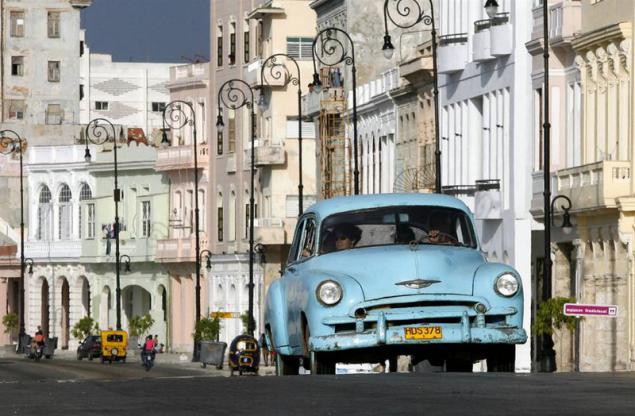
Source: aleks1780.livejournal.com

World Heritage, included in a special list of UNESCO are of great interest to the entire population of the planet. The unique natural and cultural sites make it possible to preserve the unique corners of nature and man-made monuments that demonstrate the richness of nature and possibilities of the human mind.
As of 6 July 2012 in the World Heritage List - 962 object (including 745 cultural, 188 - natural and 29 - mixed), located in 148 countries around the world. Among these there are some architectural monuments and ensembles, for example - the Acropolis, the cathedrals in Amiens and Chartres, the historic centers of cities - Warsaw and St. Petersburg, Moscow Kremlin, and Red Square; but there are also whole cities - Brasilia, Venice with the lagoon and others. There are also archaeological sites - such as Delphi; national parks - Marine Park Great Barrier Reef, Yellowstone (USA) and others. State in whose territory the World Heritage sites, are committed for their conservation.
In this you will see the Pictures of the 29 objects from different parts of our planet, which are listed UNESCO World Heritage Site.
1) Tourists visiting the Buddhist Sculpture Grottoes Longmen ("Drakensberg Gate") near the city of Luoyang in China's Henan province. At this point, there are more than 2300 caves; 110,000 Buddhist images, more than 80 Dagobah (Buddhist mausoleums), containing relics of the Buddha and 2800 inscriptions on the rocks near the river Yishui length of a kilometer. For the first time Buddhism was introduced in China in these places during the reign of the Eastern Han Dynasty. (China Photos / Getty Images)

2) Bayon Temple in Cambodia, famous for its numerous giant stone faces. The region of Angkor temples there are more than 1,000, ranging from nondescript piles of brick and rubble scattered among rice fields to the magnificent Angkor Wat, which is considered the world's largest single religious monument. Many of the temples at Angkor have been restored. Every year they are visited by over a million tourists. (Voishmel / AFP - Getty Images)

3) One part of the archaeological site of Al-Hijr - also known as Madain Salih. This complex, located in the northern regions of Saudi Arabia was added to UNESCO World Heritage List July 6th 2008. The complex includes 111 rock graves (I century BC. Oe. - I century BC), as well as a system of waterworks, dedicated to the ancient Nabataean city of Hegra, is a center of caravan trade. It also has about 50 inscriptions in the rocks belonging to donabateyskomu period. (Hassan Ammar / AFP - Getty Images)

4) Waterfalls «Garganta del Diablo» («Devil's Throat" are located in the Iguaçu National Park in the Argentine province of Misiones. Depending on the water level in the river Iguazu, in the park there are from 160 to 260 waterfalls and more than 2,000 species of plants and 400 species of birds. Iguazu National Park was included in the World Heritage List in 1984. (Christian Rizzi / AFP - Getty Images)

5) The mysterious Stonehenge megalithic stone structure, consisting of 150 huge stones, and is located on Salisbury Plain in the English county of Wiltshire. This ancient monument is believed to have been built in 3000 BC Stonehenge was included in the UNESCO World Heritage list in 1986. (Matt Cardy / Getty Images)

6) Tourists stroll from Bafang Pavilion in the Summer Palace, a famous classic imperial garden in Beijing. Summer Palace, built in 1750 was destroyed in 1860 and rebuilt in 1886. It was included in the World Heritage List in 1998. (China Photos / Getty Images)

7) Statue of Liberty at sunset in New York. "Lady Liberty", which was presented to the United States, France, stands at the entrance to New York Harbor. It was included in the World Heritage List in 1984. (Seth Wenig / AP)

8) «Solitario George» (Lonesome George), the last living giant tortoise of this species, was born on the island of Pinta, lives in the Galapagos National Park in Ecuador. She is now about 60-90 years. The Galapagos Islands were originally included in the World Heritage List in 1978, but in 2007 were noted as endangered year. (Rodrigo Buendia / AFP - Getty Images)

9) People skating on the ice channel near the mills of Kinderdijk, a UNESCO World Heritage Site and is located near Rotterdam. In Kinderdijk in the Netherlands is the largest collection of historic mills, in addition, the region is one of the main attractions in South Holland. Making balls celebrations taking place here, it gives a flavor of the place. (Peter Dejong / AP)

10) View of the Perito Moreno Glacier is located in the National Park Los Glaciares National Park, in south-eastern Argentine province of Santa Cruz. This place was listed as a UNESCO World Heritage Site in 1981. Glacier is one of the most interesting tourist attractions in the Argentine Patagonia and parts of the 3rd largest glacier in the world after Antarctica and Greenland. (Daniel Garcia / AFP - Getty Images)

11) terraced gardens in the northern Israeli city of Haifa is surrounded by the golden-domed Shrine of the Báb, the founder of the Baha'i Faith. There is a global administrative and spiritual center of the Baha'i religion, the number of practicing that worldwide less than six million. This place was declared a World Heritage Site on July 8 2008. (David Silverman / Getty Images)

12) Aerial view of the square of St.. Peter's in Vatican City. According to the website of the World Heritage within this small state is a unique collection of artistic and architectural masterpieces. The Vatican has been included in the World Heritage List in 1984. (Giulio Napolitano / AFP - Getty Images)

13) The colorful underwater scenes the Great Barrier Reef in Australia. In this thriving ecosystem is the world's largest collection of coral reefs, including 400 species of coral and 1,500 species of fish. The Great Barrier Reef has been included in the World Heritage List in 1981. (AFP - Getty Images)

14) Camels resting in the ancient city of Petra in front of the main monument of Jordan, Al-Khazneh, or treasury, presumably representing a tomb of Nabataean king, carved from sandstone. This city is located between the Red and the Dead Sea, located at the crossroads of Arabia, Egypt, Syria, and Phoenicia. Petra is a UNESCO World Heritage in 1985. (Thomas Coex / AFP - Getty Images)

15) Sydney Opera House - one of the most famous and recognizable buildings in the world, is a symbol of Sydney and one of the main attractions of Australia. The Sydney Opera House is included in the program of the World Heritage in 2007. (Torsten Blackwood / AFP - Getty Images)

16) Rock paintings made by the San people of the tribe in the Drakensberg Mountains, located in the east of South Africa. San tribe people lived in the area Drakensberg thousands of years until it was destroyed during clashes with the Zulus and white settlers. They left behind an incredible rock paintings in the Drakensberg Mountains, which have been made in the program of the UNESCO World Heritage Site in 2000. (Alexander Joe / AFP - Getty Images)

17) General view of the city of Shibam, in the east of Yemen's Hadramout province. Shibam is renowned for its incomparable with anything comparable architecture, which is included in the UNESCO World Heritage program. All the houses here are built of mud bricks, approximately 500 homes can be considered a high-rise, as they have 5-11 floors. Shibam is often called "the oldest skyscraper city in the world" or "Manhattan of the desert", is also the oldest example of urban planning based on the principle of vertical construction. (Khaled Fazaa / AFP - Getty Images)

18) Gondolas at the Grand Canal in Venice. On the background is visible the church of San Giorgio Maggiore. Venice Island - the seaside resort, the center of international tourism of global importance, the venue of international film festivals, art and architectural exhibitions. Venice included in the program of the UNESCO World Heritage Site in 1987. (AP)

19) Some of the 390 abandoned huge statues of compressed volcanic ash (moai on Rapa Nui language) at the foot of the volcano Rano Raraku on Easter Island, 3,700 km from the coast of Chile. National Park Rapa Nui is included in the program of the UNESCO World Heritage since 1995. (Martin Bernetti / AFP - Getty Images)

20) Visitors walk along the Great Wall of China in Simatai district, north-east of Beijing. It is the largest monument of architecture was built as one of the four major strategic strongholds for the purpose of defense against invading tribes from the north. Great Wall length of 8851, 8 km away is one of the largest ever completed construction projects. It was included in the World Heritage List in 1987. (Frederic J. Brown / AFP - Getty Images)

21) Temple in Hampi, near the southern Indian city of Hospet, north of Bangalore. Hampi is located in the midst of the ruins of Vijayanagara - former capital of the Vijayanagara Empire. Hampi and its monuments have been included on the List of World Heritage Sites in 1986. (Dibyangshu Sarkar / AFP - Getty Images)

22) Tibetan pilgrim prayer mill rotates in the territory of the Potala Palace in Tibet's capital Lhasa. Potala Palace - a royal palace and Buddhist temple complex, which was the main residence of the Dalai Lama. Today the Potala Palace is a museum, is actively visited by tourists, while remaining a place of pilgrimage for Buddhists and continuing use in Buddhist rituals. In view of the huge cultural, religious, artistic and historical significance made to the 1994 UNESCO World Heritage Site. (Goh Chai Hin / AFP - Getty Images)

23) Inca citadel of Machu Picchu in the Peruvian city of Cusco. Machu Picchu, especially after obtaining the status of World Heritage Site by UNESCO in 1983, became a center of mass tourism. On the day of the city is visited by 2,000 tourists; in order to preserve the monument by UNESCO calls to reduce the number of tourists per day to 800. (Eitan Abramovich / AFP - Getty Images)

24) The Buddhist pagoda Kompong-Daito on Mount Koya, in the province of Wakayama, Japan. Mount Koya, located east of Osaka, was listed as a UNESCO World Heritage site in 2004. The first settled here 819 a Buddhist monk Kukai, founder of Shingon, a branch of Japanese Buddhism. (Everett Kennedy Brown / EPA)

25) Tibetan women walking around Bodhnath Stupa in Kathmandu - one of the oldest and most revered Buddhist shrines. On the faces of his crowning tower depicts the "eyes of Buddha", inlaid with ivory. Kathmandu Valley a height of about 1300 meters - mountain valley and a historical region of Nepal. Here there are many Buddhist and Hindu temples from the stupa Bodnath to tiny street altars in the walls of houses. Locals say that the Kathmandu Valley in the lives of 10 million gods. Kathmandu Valley was added to the World Heritage List in 1979. (Paula Bronstein / Getty Images)

26) A bird flies over the Taj Mahal - the mausoleum-mosque, located in the Indian city of Agra. It was built by Mughal emperor Shah Jahan in memory of his wife Mumtaz Mahal, who died in childbirth. Taj Mahal was included in the UNESCO World Heritage List in 1983. Architectural marvel was also named one of the "New Seven Wonders of the World" in 2007. (Tauseef Mustafa / AFP - Getty Images)

27) Located in the north-eastern Wales, the 18 kilometer long Pontcysyllte Aqueduct - a feat of civil engineering of the Industrial Revolution, which was completed in the early years of the 19th century. After more than 200 years after its opening, it is still used and is one of the busiest areas of the UK network channel, passing approximately 15,000 boats per year. In 2009, the aqueduct Pontkisilte was entered in the UNESCO World Heritage List as "a milestone in the history of civil engineering of the Industrial Revolution." This aqueduct - one of the most unusual sites plumbing and running water (Christopher Furlong / Getty Images)

28) A herd of elk grazing in the meadows of Yellowstone National Park. Against the backdrop of a mountain visible Holmes, left, and Mount Dome. In Yellowstone National Park, which occupies nearly 900 thousand. Ha, is more than 10,000 geysers and hot springs. Park was included in the World Heritage Site in 1978. (Kevork Djansezian / AP)

29) The Cubans go to the old car on the promenade "Malecon" in Havana. UNESCO has made Old Havana and its fortifications in the World Heritage List in 1982. While Havana has expanded, and its population of more than 2 mln. People, its old center retains an interesting mix of monuments of Baroque and neo-classical and homogeneous ensemble of private houses with arcades, balconies, wrought-iron gates and courtyards. (Javier Galeano / AP)

Source: aleks1780.livejournal.com



